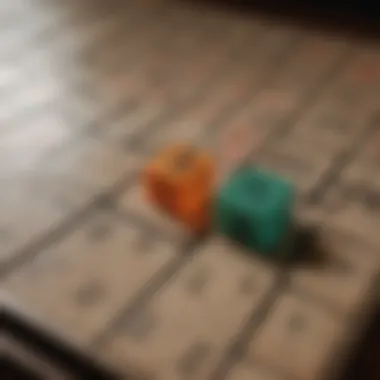Unraveling the Enigmatic Universe of Sudoku: A Comprehensive Exploration


Game Reviews
Sudoku, a logic-based number-placement puzzle, has amassed a loyal following worldwide due to its captivating gameplay and mental challenges. Its origins can be traced back to Switzerland in the late 18th century, evolving over time into the popular grid-based format known today.
Overview
Sudoku revolves around filling a 9x9 grid with digits so that each column, row, and 3x3 subgrid contains all the numbers from 1 to 9. With a seemingly simple premise, the game offers a myriad of complex strategies to solve each puzzle, engaging players of all skill levels.
Gameplay
The essence of Sudoku lies in its requirement for logical reasoning and critical thinking. Players must strategically place numbers while maintaining a balance across the grid, avoiding repetitive digits in rows and columns. This process demands concentration and analytical skills, providing a mentally stimulating experience.
Pros & Cons
One of the major pros of Sudoku is its accessibility to players of all ages, offering a leisurely yet intellectually rewarding activity. However, some may find the puzzles challenging, leading to frustration or disinterest. It is crucial to strike a balance between difficulty levels to ensure player engagement.
Final Verdict
Introduction to Sudoku
In this segment, we delve into the critical foundation of Sudoku, providing a gateway to its intricate world. Understanding the essence of Sudoku is crucial to mastering the game's complexities. For both newcomers and seasoned enthusiasts, this section serves as a stepping stone to unravel the mysteries and strategies embedded in every Sudoku grid.
Origins of Sudoku
Historical Background
Delving into the historical roots of Sudoku enlightens us on its evolution over the ages. The inception of the game, its initial forms, and the gradual metamorphosis into the modern puzzle we recognize today showcase a rich tapestry of cultural and intellectual development.
Evolution of the Game
Exploring the evolutionary path of Sudoku reveals how it has adapted and grown through time to capture global attention. The changes in rules, grid complexity, and solving techniques depict a fascinating journey of innovation and challenge.
Global Spread
The globalization of Sudoku paints a picture of how this Japanese-inspired game transcended borders and captivated minds worldwide. The proliferation of Sudoku in different regions reflects its universal appeal and enduring charm among diverse populations.
Definition and Gameplay
In dissecting the core components of Sudoku, we unravel the rules and structures that govern this puzzling phenomenon. The intricacies of the grid, the regulations guiding number placement, and the ultimate objectives of completing a Sudoku puzzle encapsulate the essence of its gameplay.
Rules of Sudoku
Mastering the rules of Sudoku lays the groundwork for tackling even the most challenging puzzles with confidence. Understanding the constraints and requirements of filling the grid correctly paves the way for honing problem-solving skills and logical reasoning.
Objective of the Game
The ultimate goal of a Sudoku puzzle goes beyond mere number placement; it beckons players to engage their cognitive faculties in a strategic dance of deduction and analysis. Unraveling the mystery of each grid piece by piece leads to a sense of accomplishment and mental agility.
Grid Structure


The layout of a Sudoku grid holds the secrets to unlocking its enigmatic patterns and solutions. Delving into the nuances of grid structure unveils the systematic organization that underpins every successful Sudoku puzzle, guiding players through a maze of numerical possibilities.
Appeal of Sudoku
The allure of Sudoku lies in its ability to challenge the mind, stimulate logical thinking, and foster a sense of serene concentration. Each aspect of Sudoku's appeal brings forth a unique set of mental exercises and rewards that cater to puzzle enthusiasts seeking both mental stimulation and relaxation.
Mental Challenge
Navigating through the mental challenges posed by Sudoku tests one's ability to think critically, strategize effectively, and persevere in the face of complexity. Engaging with the demanding puzzles sharpens mental acuity and enhances problem-solving skills with each solved number.
Logic and Deduction
The core of Sudoku's appeal rests on its foundation of logic and deduction, where every move is a step towards unraveling a complex web of interdependent numbers. The logical reasoning required to deduce the next correct digit heightens cognitive abilities and fosters a disciplined approach to problem-solving.
Relaxation and Focus
While Sudoku is a formidable mental exercise, it also serves as a calming refuge for those seeking respite from the chaos of everyday life. Immersing oneself in the gentle rhythm of Sudoku promotes mindfulness, relaxation, and a serene focus that washes away stress and distractions.
Strategies for Mastering Sudoku
In this section of the article, we delve into the crucial aspect of mastering Sudoku, shedding light on valuable techniques and approaches that enhance gameplay proficiency. Delving into the realm of Sudoku strategies is essential for both beginners looking to improve their skills and seasoned players aiming for mastery. By understanding and employing strategic methods, players can tackle puzzles with more precision and efficiency, ultimately enhancing their overall experience and enjoyment.
Basic Techniques
Single Candidate Strategy
The Single Candidate Strategy stands as a foundational technique in solving Sudoku puzzles efficiently. It involves identifying cells with only one possible candidate, thus simplifying the decision-making process and moving closer to completing the grid. This strategy is highly beneficial as it provides a clear starting point for players, helping them establish a solid foundation for more complex moves. While the Single Candidate Strategy may seem basic, its significance lies in its ability to kickstart the puzzle-solving journey with ease and clarity.
Naked Pairs and Triples
Naked Pairs and Triples strategy involves spotting pairs or triples of candidates in a unit (row, column, or block) that are confined to specific cells. By identifying these patterns, players can eliminate other candidates in those cells, narrowing down the available options and simplifying the puzzle. This technique adds a layer of complexity to gameplay by requiring a keen eye for potential patterns and logical deductions. While challenging, mastering this strategy can significantly enhance a player's problem-solving skills and overall puzzle-solving efficiency.
Hidden Singles
Hidden Singles tactic focuses on identifying cells that contain a single candidate hidden among other candidates. By recognizing these hidden singles, players can deduce the correct numbers for those cells, contributing to puzzle progression. This strategy requires a careful analysis of candidate placements and potential conflicts within the grid. While more intricate than the Single Candidate Strategy, mastering Hidden Singles provides players with a deeper understanding of puzzle dynamics and a more nuanced approach to puzzle-solving.
Advanced Approaches
X-Wing and Swordfish
X-Wing and Swordfish strategy entails identifying complex patterns across multiple rows and columns that limit the placement of specific numbers. By recognizing these formations, players can effectively eliminate candidates in certain cells, making strategic moves to resolve the puzzle. This advanced technique challenges players to think strategically and visualize puzzle scenarios beyond individual units, enhancing their critical thinking and analytical skills.
Coloring Technique
The Coloring Technique involves assigning colors to candidates based on their relationships within the grid. By marking candidates with distinct colors and observing how they interact, players can draw logical deductions to solve the puzzle. This approach introduces a visual element to Sudoku solving, requiring players to maintain focus and track relationships between colored candidates. While intricate, mastering the Coloring Technique offers a unique perspective on puzzle-solving and enhances players' pattern recognition abilities.
Unique Rectangles
Unique Rectangles strategy revolves around identifying rectangle formations within the Sudoku grid that lead to contradictions if specific numbers are placed. By understanding these unique patterns, players can make informed decisions about candidate placements, progressing through the puzzle with strategic moves. This complex strategy challenges players to analyze grid configurations in a methodical manner, honing their problem-solving skills and fostering a deeper appreciation for Sudoku intricacies.
Online Tools and Resources


Popular Sudoku Apps
Popular Sudoku Apps provide enthusiasts with digital platforms to engage with puzzles, offering a convenient and interactive way to enjoy the game on the go. These apps feature a range of difficulty levels, hints, and time-based challenges, catering to players of all skill levels. Additionally, they often incorporate sleek interfaces, intuitive controls, and social sharing features, enhancing the overall Sudoku experience for users. While convenient, players should be mindful of over-reliance on digital tools, ensuring a balance between digital and traditional puzzle-solving methods.
Websites for Sudoku Puzzles
Websites dedicated to Sudoku puzzles serve as valuable resources for players seeking diverse puzzles, tutorials, and community engagement. These platforms host a plethora of puzzle variations, strategies, and competitions, catering to Sudoku enthusiasts worldwide. Players can access an array of difficulty levels, practice different solving techniques, and even participate in online tournaments to test their skills. While websites offer limitless Sudoku opportunities, players should approach online puzzles mindfully, ensuring a healthy balance between screen time and mental stimulation.
Community Forums and Challenges
Community Forums and Challenges provide Sudoku enthusiasts with avenues to connect, share strategies, and participate in friendly competitions. These online communities foster a sense of camaraderie among players, encouraging collaboration and mutual learning. Players can engage in challenges, seek advice from seasoned solvers, and contribute to discussions on puzzle-solving approaches. While community forums offer a supportive environment for Sudoku enthusiasts, players should approach interactions respectfully, valuing diverse perspectives and fostering a positive and inclusive community spirit.
Cognitive Benefits of Sudoku
In this section, we will delve into the critical aspect of the cognitive benefits associated with playing Sudoku. Sudoku is not just a game but a mental exercise that has significant implications. By engaging with Sudoku puzzles, individuals can enhance their cognitive abilities, such as memory, concentration, and problem-solving skills. It serves as a brain workout that challenges and improves various cognitive functions.
Enhanced Memory and Concentration
Neuroplasticity:
Neuroplasticity, a key concept in neuroscience, refers to the brain's ability to reorganize itself by forming new neural connections throughout life. In the context of Sudoku, engaging in this game stimulates neuroplasticity by creating new pathways in the brain related to logic and spatial reasoning. This adaptability of the brain contributes to improved cognitive functioning and mental agility. Sudoku plays a vital role in enhancing neuroplasticity due to its complex nature that necessitates constant mental engagement.
Improving Focus:
Improving focus is another crucial benefit of Sudoku. As individuals solve Sudoku puzzles, they hone their ability to concentrate for extended periods, training their minds to maintain focus amidst distractions. This heightened focus transcends the game and carries over to daily tasks, boosting productivity and cognitive performance. Sudoku provides a structured environment for individuals to practice and enhance their focus skills, which is beneficial in various aspects of life.
Memory Retention:
Memory retention is significantly impacted by regular Sudoku practice. The game requires players to memorize patterns, numbers, and logical sequences, exercising their memory capacity. By repeatedly engaging in Sudoku challenges, individuals improve their short-term and long-term memory retention capabilities. This cognitive benefit extends beyond the game, aiding individuals in academic, professional, and personal spheres by enhancing their ability to recall information efficiently.
Stress Reduction and Mental Agility
Cognitive Flexibility:
Sudoku promotes cognitive flexibility, which is the ability to adapt and shift thinking strategies when faced with new or challenging situations. By navigating through the diverse puzzles and logical conundrums of Sudoku, players enhance their cognitive flexibility, fostering creativity and problem-solving skills. This mental agility acquired through Sudoku extends to real-world scenarios, enabling individuals to approach problems with nimbleness and innovative thinking.
Emotional Well-Being:
Emotional well-being is a crucial aspect influenced by Sudoku. As individuals engage in this puzzling game, it provides a sense of accomplishment upon successfully completing challenging puzzles, boosting self-esteem and emotional well-being. The satisfaction gained from overcoming Sudoku obstacles promotes a positive emotional state, reducing stress and anxiety levels. Sudoku serves as an emotional outlet that not only entertains but also nurtures psychological resilience.
Problem-Solving Skills:
Sudoku plays a fundamental role in enhancing problem-solving skills. The game presents complex challenges that require strategic thinking, logical deductions, and systematic approaches to reach solutions. By regularly practicing Sudoku, individuals sharpen their analytical and problem-solving abilities, fostering a methodical and organized mindset. These honed problem-solving skills are transferable to various life situations, enabling individuals to tackle challenges with confidence and efficacy.
Sudoku in Popular Culture
Sudoku in popular culture holds a significant position in the overarching exploration of Sudoku. It serves as a compelling bridge between the classic puzzle's traditional roots and its modern-day renaissance. This section delves deep into the multifaceted interactions of Sudoku with media, entertainment, and societal interests, shedding light on its evolution into a cultural phenomenon. By dissecting the various aspects of Sudoku's presence in popular culture, we uncover its enduring appeal and adaptability across different platforms.
Sudoku in Media and Entertainment


Books and Magazines
The realm of books and magazines has played a pivotal role in popularizing Sudoku as a mainstream intellectual pursuit. Publications dedicated to Sudoku not only provide a platform for enthusiasts to engage with challenging puzzles but also contribute to the ongoing discourse surrounding mental stimulation and problem-solving. The tactile experience of solving Sudoku on paper, coupled with the portability and accessibility of puzzle compilations, makes books and magazines a preferred choice for individuals seeking cognitive enrichment.
Movies and TV Shows
The integration of Sudoku into movies and TV shows adds an innovative dimension to the puzzle's narrative fabric. By featuring Sudoku-solving characters or plotlines embedded with the logic and thrill of puzzle-solving, visual media platforms introduce Sudoku to a broader audience, transcending its conventional perception as a solitary pastime. The captivating visuals and dynamic storytelling surrounding Sudoku in movies and TV shows offer a fresh perspective on the game, enhancing its entertainment value and cultural relevance.
Celebrities Who Love Sudoku
Celebrities who openly embrace Sudoku bring a level of glamour and intrigue to the puzzle, elevating its status within popular culture. By showcasing their affinity for Sudoku in public forums and interviews, well-known personalities generate curiosity and interest among their fans, thereby perpetuating the game's allure across different strata of society. The endorsement of Sudoku by celebrities not only fosters a sense of connection between fans and the game but also underscores its universal appeal and intellectual challenge.
Sudoku Tournaments and Championships
International Competitions
The arena of international Sudoku competitions serves as a battleground where skilled puzzlers test their mettle against global peers. These competitions not only showcase the strategic prowess and mental acuity of participants but also foster a sense of camaraderie and sportsmanship within the Sudoku community. By upholding standards of excellence and fair play, international competitions contribute to the ongoing evolution and popularity of Sudoku as a competitive mind sport on a global scale.
Prizes and Recognition
The allure of prizes and recognition in Sudoku tournaments acts as a motivational force for aspiring players seeking validation for their problem-solving skills. Beyond the monetary rewards, prizes symbolize achievement and distinction within the Sudoku ecosystem, incentivizing individuals to hone their strategies and participate in competitive events. The acknowledgment and accolades bestowed upon winners not only fuel their passion for the game but also elevate the status of Sudoku as a respected intellectual pursuit with tangible rewards.
Top Sudoku Players
The emergence of top Sudoku players as icons within the puzzling community highlights the dedication, skill, and perseverance required to master this intricate game. These players serve as role models and inspirations for aspiring enthusiasts, setting benchmarks of excellence and performance that shape the competitive landscape of Sudoku. By analyzing the techniques and practices of top Sudoku players, we gain insights into the strategic depths and mental agility required to excel in this challenging yet rewarding puzzle domain.
The Future of Sudoku
Sudoku, a timeless puzzle game, continues to evolve with the advancing digital landscape. In this article, we delve into the potential advancements that lie ahead for Sudoku enthusiasts. As technology progresses, so does the realm of Sudoku, opening up new avenues for players to explore and enjoy. The future of Sudoku holds exciting prospects, from enhanced gameplay experiences to innovative learning opportunities.
Digital Evolution
Augmented Reality Sudoku
Augmented Reality Sudoku introduces a fascinating blend of virtual elements into the traditional Sudoku gameplay. This integration allows players to immerse themselves in a dynamic and interactive puzzle-solving experience. The key characteristic of Augmented Reality Sudoku lies in its ability to merge the physical and digital worlds seamlessly, creating an engaging and innovative platform for players to enjoy. The unique feature of Augmented Reality Sudoku is its capability to provide real-time feedback and hints, enhancing the overall gaming experience. While it offers a novel approach to Sudoku, some may find the reliance on technology restricts the classic pen-and-paper feel that traditional players cherish.
AI and Machine Learning Integration
The integration of AI and machine learning algorithms brings a new dimension to the world of Sudoku. By incorporating intelligent systems into gameplay, players can receive personalized hints and suggestions based on their solving patterns. This feature streamlines the puzzle-solving process and provides a tailored experience for each player. The standout characteristic of AI and Machine Learning Integration is its adaptability and efficiency in generating hints that align with the player's skill level. While this aspect enhances the accessibility and enjoyment of Sudoku, some purists may argue that it diminishes the essence of strategic thinking and deductive reasoning inherent in the game.
Virtual Reality Sudoku Experiences
Virtual Reality Sudoku Experiences transport players into a fully immersive and interactive Sudoku environment. By donning VR headsets, players can step into a virtual world where Sudoku grids come to life around them. The key characteristic of Virtual Reality Sudoku lies in its ability to provide a three-dimensional puzzle-solving experience, adding a tactile and spatial element to gameplay. The unique feature of Virtual Reality Sudoku is its capacity to offer varying degrees of difficulty and puzzle layouts, catering to players of all skill levels. While this innovation revolutionizes the traditional Sudoku experience, some traditionalists may perceive it as distancing players from the tangible connection of solving on paper.
Educational Implications
Sudoku in Schools
The incorporation of Sudoku in educational settings enriches students' cognitive development and problem-solving skills. By introducing Sudoku puzzles as educational tools, schools provide students with a fun and engaging way to enhance their logical thinking and strategic planning abilities. The key characteristic of Sudoku in Schools is its ability to promote critical thinking and perseverance while fostering a love for puzzles and challenges among students. The unique feature of Sudoku in Schools is its versatility in adapting to different age groups and academic curricula, making it a valuable asset for educators. Despite its educational benefits, some may argue that the emphasis on Sudoku puzzles could potentially overshadow other learning outcomes.
Cognitive Development Programs
Cognitive Development Programs leverage Sudoku as a core component in enhancing cognitive abilities across various age groups. These programs utilize Sudoku puzzles to stimulate memory, focus, and problem-solving skills, offering a holistic approach to mental agility. The key characteristic of Cognitive Development Programs is their structured curriculum that integrates Sudoku puzzles into brain-training exercises, fostering continuous cognitive improvement. The unique feature of Cognitive Development Programs is their personalized approach to tailoring Sudoku challenges based on individual cognitive strengths and weaknesses. While these programs demonstrate proven benefits in cognitive enhancement, skeptics may question the exclusive focus on Sudoku puzzles in isolation from broader cognitive development strategies.
Cross-Disciplinary Learning
Sudoku serves as a bridge for cross-disciplinary learning, merging puzzle-solving with various academic subjects for a comprehensive educational experience. By integrating Sudoku into different fields of study, learners can enhance their analytical skills while exploring connections between logic and other disciplines. The key characteristic of Cross-Disciplinary Learning is its ability to promote interdisciplinary thinking and problem-solving across diverse subjects. The unique feature of Cross-Disciplinary Learning is its capacity to cultivate a holistic approach to education by fostering creativity and critical thinking through Sudoku integration. While this approach enriches educational experiences, critics may question the extent to which Sudoku aligns with the core objectives of each academic discipline.



